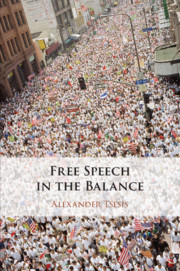Book contents
- Free Speech in the Balance
- Free Speech in the Balance
- Copyright page
- Dedication
- Contents
- Preface
- Acknowledgments
- Part I Theory
- 1 Formalism and Categorical Doctrine
- 2 Dominant Academic Approaches to Free Speech
- 3 Free Speech and Proportionality
- 4 Civic Community and Social Context
- Part II Application
- Notes
- Index
1 - Formalism and Categorical Doctrine
from Part I - Theory
Published online by Cambridge University Press: 06 November 2020
- Free Speech in the Balance
- Free Speech in the Balance
- Copyright page
- Dedication
- Contents
- Preface
- Acknowledgments
- Part I Theory
- 1 Formalism and Categorical Doctrine
- 2 Dominant Academic Approaches to Free Speech
- 3 Free Speech and Proportionality
- 4 Civic Community and Social Context
- Part II Application
- Notes
- Index
Summary
First Amendment jurisprudence contains a variety of rationales for allowing government to regulate speech in public employment, public school, and commercial contexts. Of late, however, the Roberts Court has made several statements about the First Amendment protecting all communications other than several low-value categories, including obscenity and incitement. Other than those judicially defined “historical” categories, the Court now presumes virtually all expression to be covered by the First Amendment. Ad hoc balancing is regarded to be impermissible in this field. Yet many cases contradict the Court’s statement in Reed v. Town of Gilbert: “A law that is content based on its face is subject to strict scrutiny regardless of the government’s benign motive, content-neutral justification, or lack of ‘animus toward the ideas contained’ in the regulated speech.”8 Such a bare statement overlooks the multifarious constitutional values at play in commercial regulations, national security statutes, and professional norms.
- Type
- Chapter
- Information
- Free Speech in the Balance , pp. 3 - 18Publisher: Cambridge University PressPrint publication year: 2020



